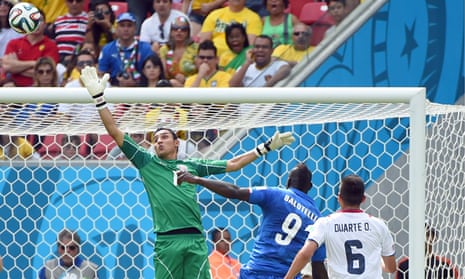No one can say he didn’t warn them. Back in April, Gazzetta dello Sport travelled to Valencia to visit the Levante goalkeeper Keylor Navas. Here was the man who was going to be in the line of fire. Costa Rica had been drawn with England, Uruguay and Italy and the assumption was as obvious as it was universal. He was asked which teams he thought would go through. Which of the other three, you understand. He didn’t know but they’d be fighting for a single place. “We’re going through,” he said, adding, “Are Italy going to join us?”.
It was not bravado and it was not a joke either. Nor does Navas worry about trying to ingratiate himself with people. Profoundly religious, he likes to quote Galatians 1:10: “Am I trying to win the approval of human beings or God? If I were still trying to please people I would not be a servant of Christ.” Before each game, he kneels on the goalline, opens his arms wide and prays. “I’ll keep doing it even if people insult me, calling me a gilipollas [dickhead],” he said.
There is something about the way Navas speaks, a conviction that does not invite contradiction. He is firm and unwavering, serious, determined and direct, a little intense. The focus does not waver. He tells the story of how he made up his mind about what he wanted to be when he saw a goalkeeper make a save. Navas was five years old, but his role model was no professional: the goalkeeper who had inspired him was aged 12. Navas had gone to a local pitch in San Isidro. “I will never forget that image,” he said.
He won six league titles with Deportivo Saprissa before joining Albacete, where the former Costa Rica goalkeeper Luis Gabelo Conejo had played. Gabelo Conejo was his idol and has been his coach. Navas stood out playing in the Spanish Second Division with Albacete, where team-mates described him as a “natural leader”. A move to Levante for €150,000 followed and following the departure of Gustavo Munúa he was a revelation.
Few keepers are so quick; it is the speed of reflexes and particularly the speed of recovery that most make him stand out. Videos of him training provide a good idea of his personality and the reasons why he performs so impressively. There is an intensity about him which is startling. Luis Llopis, the goalkeeper coach at Levante, describes him as “humble, very focused, [a man] with extremely good concentration.” Together they work on enhancing his qualities – much of the work focuses on the ability to accelerate and brake, or on saving a swift succession of shots, rattled off at speed – as well as remedying the perceived flaws in his game: his tendency to use the “wrong” hand and a propensity to punch unnecessarily. He has improved his catching and his ability to push the ball away to either side of the goal rather than straight out. Effectiveness is everything. “I don’t like to show off; if I have to save a ball in an ugly way, fine,” he says.
Working on his flaws is easier because he is “very self-critical”, “very humble,” Llopis says. “He works very hard every day and always wants to get better. Balance and acceleration is very important. He is not just a defender of his goal, he understands and reads the game much better now. He has improved a lot in that sense and his ‘invisible’ training and preventative work is good, too.” Navas’s weight has come down by five kilos since he joined the club.
The results have been spectacular. Joaquín Caparrós, who was Levante’s manager until the end of this season, insisted: “He is to us what Diego Costa is to Atlético Madrid or Carlos Bacca to Sevilla, guys who score 20-plus goals a season. For me, he’s the best goalkeeper in the world.”
He was named La Liga’s Player of the Month in March and the league’s best goalkeeper for the season. A barely believable performance against Barcelona in the second half of the season particularly stood out, so much so that the Catalans contemplated a move for him.
By budget, Levante are relegation candidates and they began the season with a 7-0 destruction at Barcelona but they finished it 10th, having conceded 43 goals, the best record outside the top four and only five more than Real Madrid. Navas broke the club record for consecutive minutes without conceding a goal, too.
Levante are an aggressive, defensive side and Navas talks about the importance of “constant communication” to “direct the defence”. And yet these were not really statistics that are explained by the meanness of the defence. Navas made more saves and more interventions than any other goalkeeper in Spain this season, on 163 saves and 268 interventions, ahead of Almería’s Esteban on 147 and 245. Statistically, he had been shot at more than most of course. But no other goalkeeper had saved a higher percentage of the shots he had faced either. He was often under constant fire.
Most expected something similar at the World Cup. But before the tournament Navas said: “We have to play with confidence and personality. We have no fear.” It was a message all the Costa Rica players shared. One Italian player privately admits that he and his team could not compete with the intensity of the Costa Ricans and that the Costa Ricans knew it; they could see fear in Italian eyes. Some even told the Italians that to their faces. They did not need as many of Navas’s saves as Levante have, but they did boast his conviction.
When Costa Rica beat Italy and qualified for the second phase, knocking England out in the process, Navas announced: “This is exactly what we wanted”. It was also exactly what he expected.
